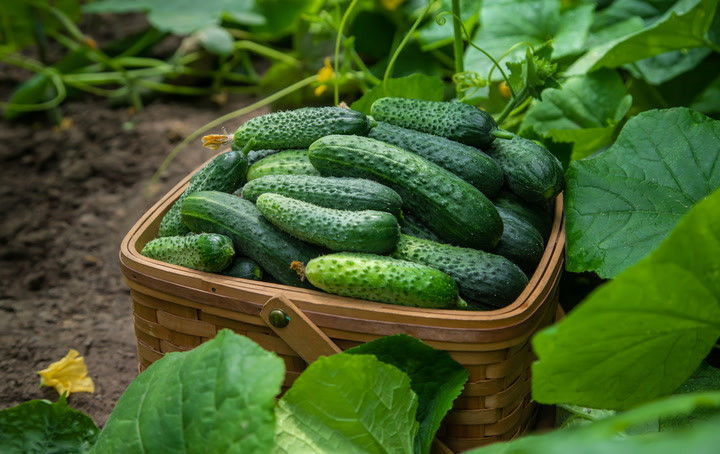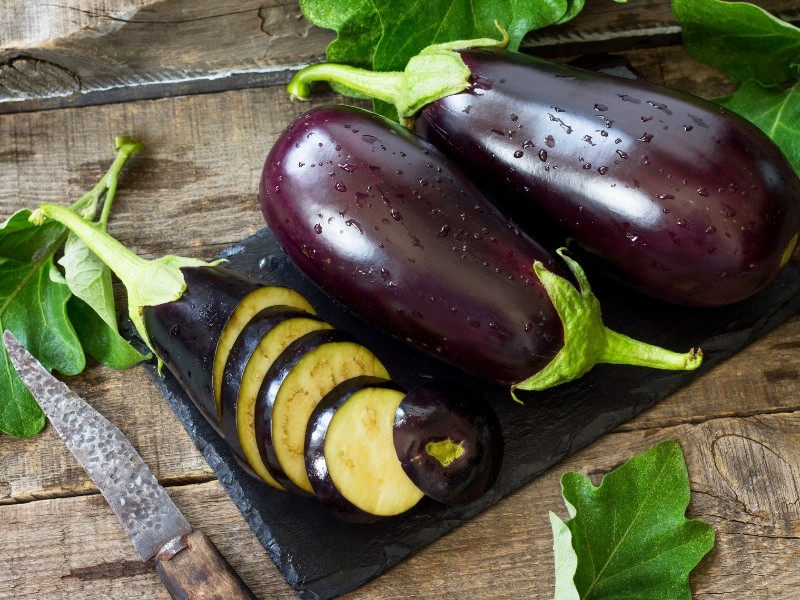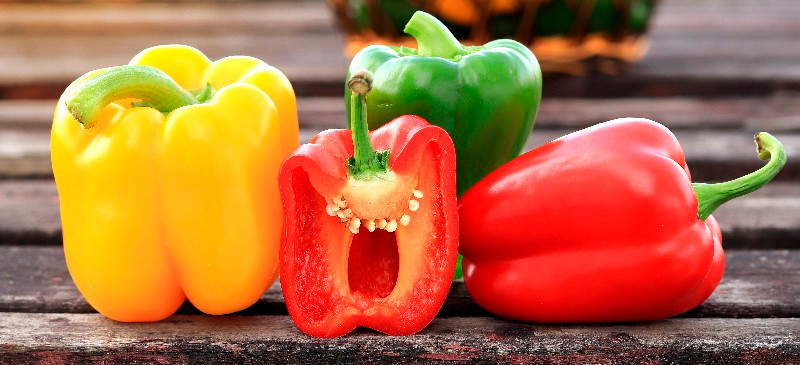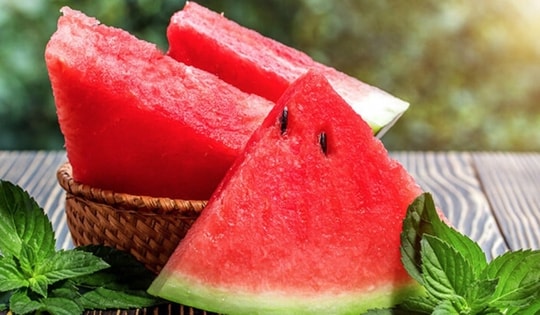10 best summer cooling vegetables and fruits
While we can't control the hot summer temperatures outside, we can keep cool inside by eating healthy, cooling vegetables.
Below are some vegetablescoolingbody, rich in vitamins in summer:
1. Cucumber cools down
As one of the most popular summer vegetables, cucumbers are not only nutritious but also have many uses. Usually, they are consumed raw in salads or as part of drinks.
Cucumbers have a high water content, making them perfect for hot days. They are also rich in antioxidants, vitamin K, and vitamin C. Cucumbers are 96% water and are a great way to stay hydrated.
According to Dr. Nguyen Duc Quang, former Head of the Department of Experimental Oriental Medicine, Military Traditional Medicine Hospital, people with weak spleen and stomach should limit their intake. People with weak kidneys and cold skin should not eat it.

2. Tomatoes
Tomatoes are often consumed raw in salads and juices, sauces, soups… Tomatoes are a great way to stay hydrated, 94-95% of tomatoes are made up of water. Tomatoes are also rich in antioxidants such as lycopene and are an excellent source of vitamins (C and K), potassium and calcium.
Note that, according to a report published by the US Department of Health and Human Services, people with advanced chronic kidney disease should limit their intake of potassium - a mineral found in abundance in tomatoes.
In addition, gout patients should also limit tomatoes because the cause of gout is due to purine metabolism disorders that increase uric acid in the blood. Meanwhile, tomatoes are a food that contains a fairly large amount of purines.
3. Gourd, cooling food
Gourd is not only used to cook soup, boil, stir-fry but can also be used to make salad. In addition to its high water content, gourd is also rich in calcium, which is good for bones, the stomach, helps reduce high cholesterol and regulates blood sugar.
Dr. Nguyen Trong Hung - National Institute of Nutrition said that 100g of squash contains: 95% water, 25% phosphorus, 21% calcium, 2.9% glucid, 0.5% protein, 1% cellulose, 0.2mg iron and vitamins: 0.02mg carotene, 0.03mg vitamin B2, 0.40mg vitamin PP, 12mg vitamin C, 0.02mg vitamin B1.
With more than 90% water, squash can completely meet the amount of water the body needs, so it is a very effective cooling food on summer days.
Note, squash is cool and delicious but you should not eat too much. You should not eat more than 3 meals of squash a week and need to eat many other vegetables so that the body can receive rich vitamins and nutrients. Squash is cold so people with cold stomach and bloating should not eat squash.
4. Eggplant
Eggplant can be made into many attractive dishes such as fried eggplant, stir-fried eggplant, crispy fried eggplant, grilled eggplant with scallion oil... Eggplant is rich in fiber, so it is essential for intestinal health. In addition, eggplant also contains flavonoids, vitamins and potassium... all of which contribute to overall health.
However, according to Dr. Le Thanh Hai, Director of Thua Thien Hue Provincial Lung Hospital, you should be careful when eating eggplant if you have kidney disease or gallstones, because eggplant contains a certain amount of oxalate.

5. Pumpkin
With over 40 varieties, pumpkin is a popular vegetable all over the world. Pumpkin can be boiled, stir-fried, made into soup, or cooked into sweet soup… all of which are delicious.
Pumpkin is rich in vitamin A, which helps boost the immune system to fight off diseases. In addition, pumpkin is also a good source of the antioxidant beta-carotene, which helps reduce the risk of heart disease and keeps the body cool.
Dr. Nguyen Trong Hung, National Institute of Nutrition, noted that you should not eat too much pumpkin at once because the high fiber content can cause bloating and digestive disorders.
6. Bitter melon
Many people do not like or cannot eat bitter melon, but in fact, bitter melon brings many health benefits, especially as an effective cooling food. Bitter melon can be used to make juice, boiled, stir-fried or eaten as salad.
Don’t let the bitter taste of this vegetable put you off as it is packed with nutrients like calcium, vitamin C, iron and potassium. Bitter melon aids digestion and regulates blood sugar levels, helping your body cope with the heat.
Dr. Vu Duy Thanh, Oriental Medicine Department, Nong Cong District General Hospital, Thanh Hoa said that people with weak spleen and stomach should not eat a lot of bitter melon.
7. Green leafy vegetables
Spinach, amaranth leaves and mint are just a few examples of leafy greens that are good for your body, especially in the summer. They are versatile in the kitchen and can be made into salads or soups to suit your taste.
Green leafy vegetables (the darker the better) are a great source of minerals like iron and calcium. They are great for summer because they are high in water content, rich in folate, and very light on the stomach.
Note, you should not eat spinach continuously or eat too much spinach because the vegetable contains high levels of oxalic acid which can easily affect kidney function.
Amaranth is rich in protein, but according to traditional medicine practitioner Bui Dac Sang (Vietnam Academy of Science and Technology, Hanoi Oriental Medicine Association), some groups of people should not eat amaranth: people with cold constitution, people with chronic diarrhea, people with loose stools, people with kidney stones, rheumatoid arthritis, gout.
8. Bell peppers
There are many varieties of bell peppers, green, red and yellow, which not only add flavor to dishes but also provide many health benefits. Bell peppers contain nutrients such as vitamin C and other antioxidants, making them a necessary addition to your summer diet.
The abundant amount of vitamin C acts as an antioxidant and bell peppers are rich in phytochemicals, including phenolics, flavonoids and carotenoids, which have powerful antioxidant properties. Antioxidants help protect against free radicals that damage DNA. Bell peppers are also rich in amino acids, which are essential for many bodily functions, including breaking down food, repairing tissue and growing.
Consuming bell peppers in moderation will not cause side effects but they may cause allergies in some people.

9. Green beans
Green beans are a popular addition to various weight loss diets because of their low calorie content. They are one of the most readily available vegetables in the market as they are grown all year round.
Green beans are ideal for cooling down in the summer. Not only are they light, they are also rich in fiber which helps improve digestion. They are also rich in vitamin K which is essential for good bone health and also contain nutrients like protein, iron, zinc and antioxidants.
Note, as with any food, some people are allergic to green beans and other legumes.
10. Carrots
Carrots can be eaten raw, cooked in soup, stewed, stir-fried or juiced and this delicious vegetable is packed with nutrients essential for the body.
Carrots are great because they are packed with vitamins, minerals, and antioxidants that support immunity; support heart, kidney, and liver health; and provide other health benefits, making carrots a great addition to the diet.
Note that in severe cases, eating too much beta carotene from carrots can cause vitamin A to become inactive and affect vision, bones, skin, metabolism, or the immune system.
Too much beta carotene can also cause problems for people who cannot convert it into vitamin A, such as those with hypothyroidism.


